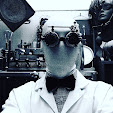As the Columbiad flew farther and farther from the earth, it's weight diminished, due to the lessening of the earth's attraction. The time was coming when it would possess no weight at all. This would be at the point where the gravitational pull of the earth and the gravitational pull of the moon neutralized each other. There was a danger, awful to think about, that at this point the projectile would stop and remain there, immovable, for ever. Preferable to that would be that, losing speed, it might fail to reach the point of equal attraction and plunge back to Earth. The likelihood, however, was that the Columbiad would still retain some of the motion given to it by its original discharge and would therefore cross the neutral line into the field of lunar attraction and fall upon the moon.
As they drew nearer and nearer to the dead line, extraordinary things began to happen within the space-ship. Captain Nicholl dropped a glass, which, instead of falling to the floor and breaking, remained suspended in mid-air! Other objects were "hung up" in space, and the dog, Diana, floated about between floor and ceiling. Devoid of weight by the cancelling out of the terrestrial law of gravity, the three men could lean at all angles without falling, and climb into the air without steps! It was a startling and novel experience.
Barbicane explained that on the moon they would weigh six times less than their weight on the earth.
"And we shall feel it?" asked Michel Ardan.
"Evidently, as 200 lbs. will only weigh 30lbs. on the surface of the moon."
"And out muscular strength will not diminish?"
"Not at all; instead of jumping one yard high, you will rise eighteen feet high."
"But we shall be regular Herculeses in the moon!" exclaimed Michel.
"Yes," replied Nicholl; "for if the height of the Selenites is in proportion to the density of the globe, they will be scarcely a foot high."
"Lilliputians!" ejaculated Michel; "I shall play the part of Gulliver. We are going to realize the fable of the giants. This is the advantage of the leaving one's own planet and overrunning the solar world."
"One moment, Michel," answered Barbicane; if you wish to play the part of Gulliver, only visit the inferior planets, such as Mercury, Venus, or Mars, whose density is a little less than that of earth; but do not venture into the great planets, Jupiter, Saturn, Uranus, Neptune; for there the order will be changed, and you will become Lilliputian."
"And in the sun?"
"In the sun, if its density is thirteen hundred and twenty-four thousands times greater, and the attraction is twenty-seven times greater than on the surface of our globe, keeping everything in proportion, the inhabitants ought to be at least two hundred feet high."
As hoped and expected, the Columbiad's speed did carry it over the neutral line. The next problem was how to land on the moon gently. Even with weight reduced to a sixth of earth-weight, a fall from such a height without some checking of speed of descent might be disastrous. Barbicane found the solution in a number of rockets, which, when fired off from the base, would produce a recoil and so check the projectile's speed.
The moon, now vast, seemed to be filling the universe, but it gradually became evident that the projectile was not going to hit it. There became no longer room for doubt. The Columbiad had been diverted from its course. Why, none of the travellers could say.
"Might it not be an excess of speed?" asked Nichol; "for we know now that its initial velocity was greater than they supposed."
"No! a hundred times, No! replied Barbicane. "An excess of speed, if the direction of the projectile had been right, would not have prevented us from reaching the moon. No. there has been a deviation. We have been turned from our course."
"By whom? by what?" asked Nicholl.
"I cannot say." replied Barbicane. But at last he found the answer. "Cursed be the meteor which crossed our path."
"What?" said Michel Ardan.
"What do you mean?" exclaimed Nicholl.
"I mean," said Barbicane in a decided tone, "I mean that our deviation is owing solely to our meeting with this erring body."
"But it did not even brush us as it passed," said Michel.
"What does that matter? Its mass, compared to that of our projectile, was enormous, and its attraction was enough to influence our course."
"So little?" cried Nicholl.
"Yes, Nicoll; but however little it might be," replied Barbicane, "in a distance of 84,000 leagues, it wanted no more to make us miss the moon."
They were brave men, all three. Bitter as was the blow, unpredictable as was their fate now that they were being borne past the moon into the unknown solitudes and perils of infinite space, they devoted their energies calmly to observing the vast heavenly body to which they had come closer than any human beings had ever been before.
Sunday, 29 August 2010
Subscribe to:
Post Comments (Atom)







1 comments:
I wonder if the command module "Columbia" of Apollo 11 was named after the "Columbiad.
There are a great number of similarities between the American space program and Jules Verne's novels.
Post a Comment